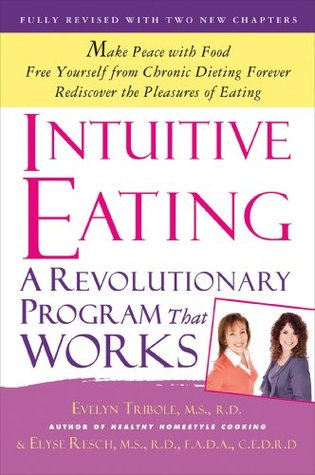More on this book
Community
Kindle Notes & Highlights
Read between
August 31 - September 25, 2019
This process involves coming from a place of curiosity rather than a place of judgment,
Don’t underestimate the profound impact self-trust can have. Psychoanalyst Erik Erikson, a noted pioneer in human development, explains how critical trust is. According to Erikson, all people must go through a series of stages throughout their lives. The first developmental stage deals
with basic trust. During each stage there is a
significant issue or crisis that presents itself and must be resolved. If this task is not handled well, a person will continue to struggle with it into adulthood. If food becomes a battleground during this stage, ...
This highlight has been truncated due to consecutive passage length restrictions.
The you-can’t-be-trusted-around-food message becomes compounded if you were put on diets by your parents or your doctor. As an adult, try as you may, you still don’t trust yourself. That child can still reside within you, making y...
This highlight has been truncated due to consecutive passage length restrictions.
Psychologist and author, Daniel Gilbert, aptly describes habituation as, “Wonderful things are especially wonderful the first time they happen, but their wonderfulness wanes with repetition” (Gilbert 2006).
Hunger Enhances Reward Value. Hunger by itself enhances the reward value of food, through triggering more dopamine-related activity.
Pavlovian Conditioning. The dopamine effect could be attributed to Pavlovian conditioning (recall the classic study, in which Pavlov’s dogs salivated at the mere ringing of a bell.
Dopamine Deprivation. Many pleasurable activities trigger dopamine, including socializing, hiking, and playing games. The great majority of people we see in our practices, who binge-eat, are often leading very unbalanced lives. These unbalanced lives “deprive” them of the dopamine benefits. When needs are not being met, food becomes even more enticing, more rewarding.
what is it about satisfaction that is so powerful? Abraham Maslow has taught us that we are driven by our unmet needs. We want what we can’t have and will do whatever it takes to calm down the sense of deprivation that inevitably arises when our needs are not satisfied.
Knowing what you like to eat, and believing that you have the right to enjoy food, are key factors in a lifetime of maintaining normal weight without dieting.
You may go for a long time without using food to cope, when all of a sudden emotional eating catches you by surprise. If this occurs, it’s not a sign of failure or that you’ve lost ground; instead, it’s a strange gift. Overeating is simply a sign that stressors in your life at that moment surpass the coping mechanisms that you have developed. Some of these stressors are divorce, a job change, a move to a new city, the death of someone close, marriage, or the birth of a child. These may be new or unexpected experiences for you. As a result, you haven’t had the opportunity to develop coping
...more
What Is Healthy Eating? We define healthy eating as having a healthy balance of foods and having a healthy relationship with food.


